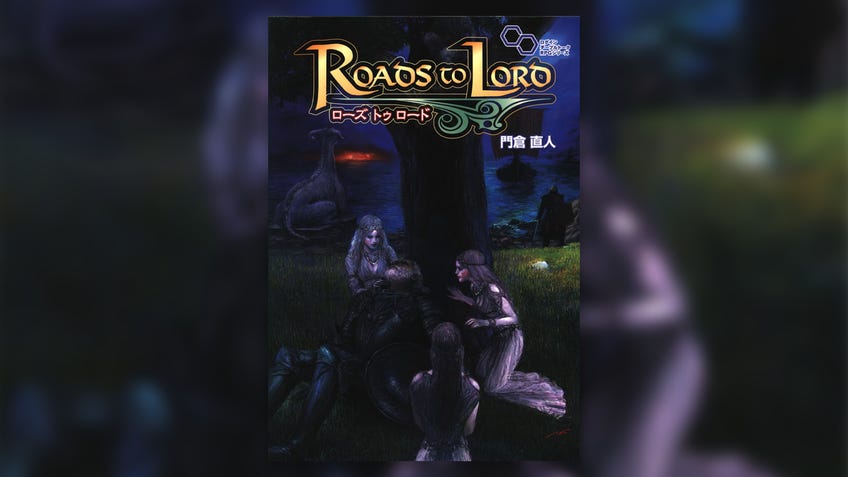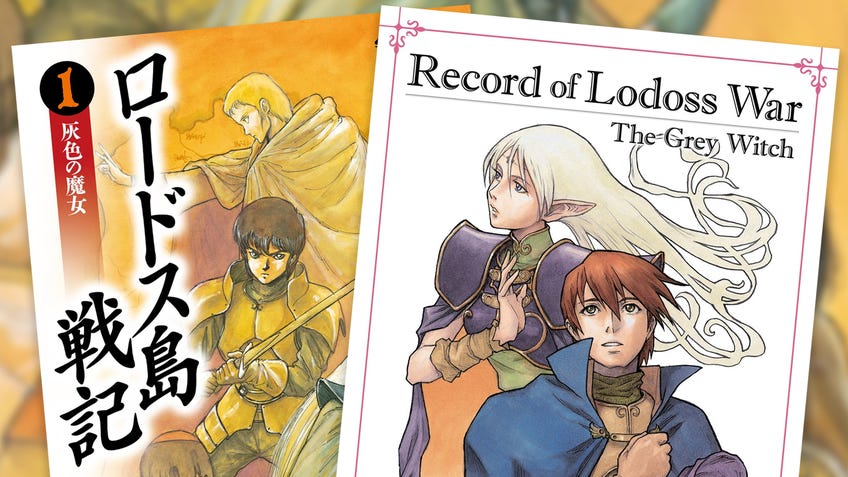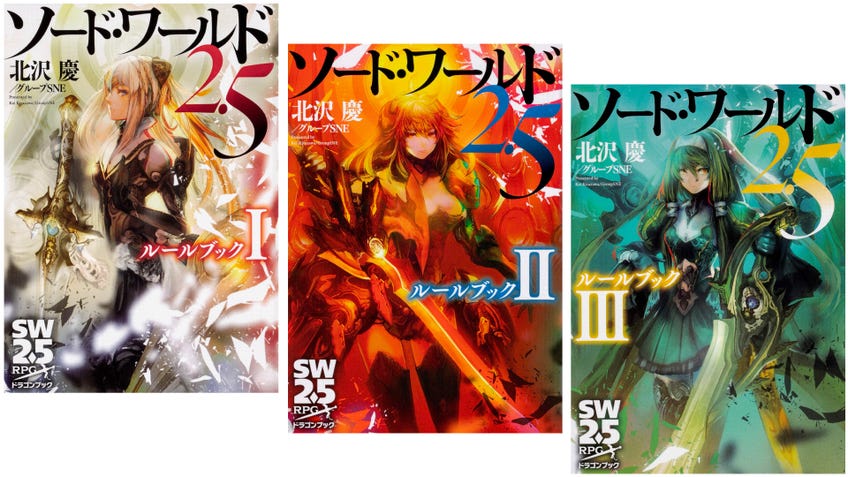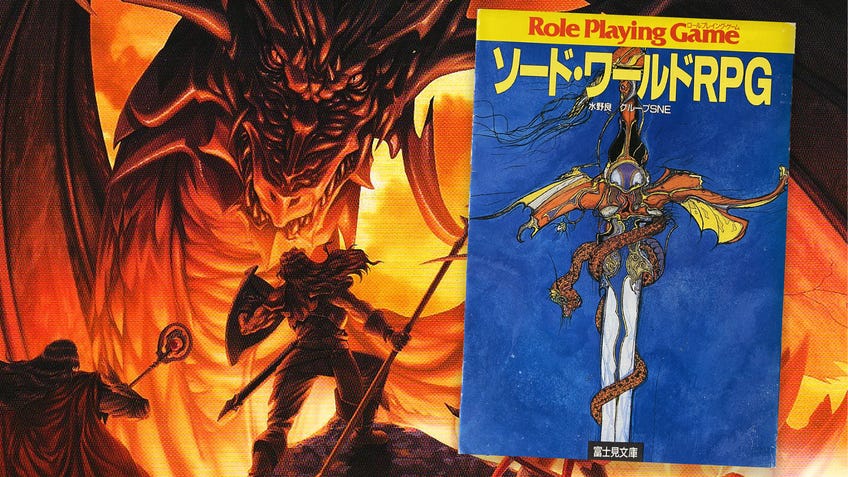Exploring Sword World, Japan’s answer to Dungeons & Dragons from the studio behind the Elden Ring tabletop RPG
The history of legendary tabletop creator Group SNE.
In July 2022, an Elden Ring tabletop RPG was announced by Kadokawa, a strangely massive publishing company that deals with almost anything and everything paperback in Japan.
This announcement was covered heavily by most western outlets - which is not surprising, considering the popularity of the video game. However, it is quite odd since we rarely hear about the Japanese tabletop RPG scene in English-language media.
For decades, Japan has been a dominating force when it comes to digital games and even some forms of tabletop gaming, such as Pokémon trading cards. Nonetheless, tabletop RPGs are something often overlooked by comparison.
When you go to Akihabara, the biggest ‘nerd’ (or ‘otaku’, as it is known in Japan) centre in all of Tokyo - with hundreds of shops dedicated to video games, trading cards, manga, electronics and more - you might find yourself surprised at the lack of traditional tabletop games such as Dungeons & Dragons. Warhammer maker Games Workshop has recently found some success by opening up shops in Akihabara and other similar districts, but nothing near the amount of enthusiasm and crowded shops you find elsewhere in the area.
The world of tabletop games in Japan is still somewhat immune to the D&D phenomenon.
With the great success in Japan of D&D-inspired classic fantasy games such as Dragon Quest, as well as more recent isekai - a popular genre of stories about people finding new lives in fantasy/sci-fi worlds - light novels mostly set in D&D-esque worlds, one would assume the original tabletop game must be very well-loved.
But that is not the case. While there have been recent attempts at popularising Dungeons & Dragons among the Japanese audience - including with some good old-fashioned cheesy commercials - the world of tabletop games in Japan is still somewhat immune to the D&D phenomenon.

Japan’s tabletop RPG history can be traced back to the late 1970s when some American-made roleplaying games were imported to Japan and mostly played by American college students. Things slowly shifted when board game magazines such as Tactics introduced wargames including Battle for Germany and Napoleon at Waterloo to the Japanese audience.
Toy makers Tusukuda Hobby and Bandai realised that this might be a great opportunity for them to make money off of localised and Japanese-made board games. In 1984, Tsukuda Hobby released Roads to Lord, which is widely considered to be the first-ever Japanese-made tabletop RPG. The game is a meticulously-designed RPG inspired by The Lord of the Rings that is very similar to your generic fantasy setting, with the difference being that every single person in the world can use magic. The creativity of Roads to Lord made some heads turn, but it didn’t quite capture the imagination of the public the way D&D did in the West.
Japan’s interest in tabletop RPGs grew out of its love for digital games such as Dragon Quest and Final Fantasy, which came out in the mid-1980s. When video game magazine Beep (later known as Gemaga) published an article on D&D as the source of RPG games on PC and Famicom, such as Wizardry and Ultima, a lot of people became motivated to know more about this unknown world from the West - similar to how modern-day Dark Souls fans are motivated to know more about King’s Field as the source of Demon’s Souls.
In the second half of the 1980s, Comptiq, a well-known PC magazine, published a ‘replay’ of Record of Lodoss War by tabletop publisher Group SNE. The Record of Lodoss War was a replay of Dungeons & Dragons: a highly-edited and rewritten session transcript of a D&D session that was meant to be played again. Literally, a re-play.
Small choices, such as making the game playable with only d6 dice, made Sword World much more accessible than D&D.
After the great success of The Record of Lodoss War, Group SNE wanted to publish more Record of Lodoss War-related content but reportedly didn’t want to be absorbed by US D&D publisher TSR and pay licensing fees for using its game. So, it instead decided to set Record of Lodoss War in a world that was very similar to Dungeons & Dragons’ in having a fantasy medieval setting and an almost identical magic system, but with different characteristics that made it more accessible for a Japanese audience - similar to how playing JRPGs set in D&D-inspired worlds feels.
The Record of Lodoss War’s great success paved the way not just for it to become a multimedia franchise but for Group SNE to absolutely dominate the Japanese tabletop scene - something that continues to this very day.

Just a couple of years after Record of Lodoss War, Group SNE released a rulebook for a brand new RPG called Sword World. Set in the same universe as Record of Lodoss War, the Sword World RPG found massive success among high-schoolers in Japan.
The success of Sword World RPG in contrast with its competitors is often attributed to the economic choice of providing play materials in a cheap paperback format instead of selling them in expensive boxes - which was the traditional way of buying TRPGs at the time. So, for example, a high-schooler who wanted to play a tabletop RPG with their friends had a much better chance of going for Sword World than anything else. Small choices, such as making the game playable with only d6 dice, made it much more accessible than D&D. The fact that Shinwa, the Japanese publisher of Dungeons & Dragons, went out of business around the same time almost certainly contributed to this as it became literally impossible to find D&D materials.
After the decline of tabletop RPGs worldwide in the mid-1990s, Sword World RPG came back in the early 2000s with the release of a new edition, 2.0, that inspired a generation of game designers to create their own tabletop RPGs. These often catered to certain niches, such as the Alshard series set in the Norse-inspired world of Midgard.
Sword World and the wider world of tabletop roleplaying really took off in Japan in the early 2010s when replay videos of Sword World 2.0 became widespread - somewhat similar to how Critical Role sparked interest among a wider Western audience to try out D&D.

“While Dungeons & Dragons is still quite big among the gaijin [foreigner] community, the Japanese don’t seem to like it that much,” says Julien D’aubert, a French game design student who has lived in Japan for five years.
He adds that Sword World is not necessarily bigger than Dungeons & Dragons but rather a replacement; Dungeons & Dragons’ fantasy seems too similar to Sword World, minus the cultural adjustments that resulted in its success in Japan, such as having heroes going through character arcs similar to those seen in manga and anime.
Comparing Sword World to D&D is like comparing The Witcher with Dragon Quest.
“It’s like comparing The Witcher with Dragon Quest,” D’aubert explains. “I don’t think The Witcher could ever reach the same popularity as Dragon Quest even though they are both RPGs taking place in a fantasy universe.”
For D’aubert, the cultural difference between Japan and the West is the main issue preventing D&D from becoming a huge hit in the Japanese market. He brings up the differences in people’s tastes in video games, noting how many games that are popular in Japan - such as the Monopoly-like Momotaro Dentetsu - don’t attract the same amount of attention in the West.
Shin, a Japanese player who grew up in the US and has been a member of tabletop RPG communities throughout the world for over 20 years, holds a different opinion. He believes that the market is the driving force, rather than culture. Due to the attention that western horror RPG Call of Cthulhu has received in Japan, D&D’s failure in achieving the same thing is simply due to its strategic mistakes.
“When you mention tabletop roleplaying games, everyone in Japan will think of CoC. Just like how people in the US and the western world will think of D&D.”
Shin believes there is a possibility for D&D to surpass Sword World if it finds a way to attract the Japanese market. However, Group SNE’s new Elden Ring game might change that course entirely and, much like the love for Japanese video game RPGs in the west, spur a global audience to become invested in Sword World and Japanese tabletop RPGs.


